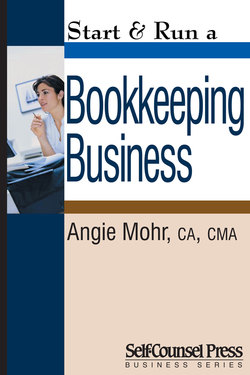Читать книгу Start & Run a Bookkeeping Business - Angie Mohr - Страница 14
На сайте Литреса книга снята с продажи.
You’ll Need a Business Plan
ОглавлениеYou no doubt have heard it from your banker or your accountant: “Prepare a business plan!” Everyone advises it (and you can advise your bookkeeping clients to do one if they haven’t already), but do you know the purpose of a business plan?
A business plan is not simply a document that you cobble together for your bank when you approach the bank to borrow money. It is a living, breathing map of where your business is headed. It encompasses your vision of the business and the steps you will take to get it there. It quantifies your dreams. If that seems a little cold and impersonal, remember that no one gets to their destination without a map.
When I refer to your business plan as a living, breathing document, it means that, as circumstances change, so should your business model. You will have to continually make course corrections as you go along and as you gain understanding about how your business performs over time.
Although you will always be not only the creator but also the main audience for your business plan, there will be others who will want to see your business plan from time to time, including the following:
• Lenders. They will want to make sure that they are lending money to a solid enterprise that has a probability of success.
• Key employees. When you hire a manager or other employee critical to the success of your bookkeeping practice, you will want to make sure that person knows the business plan and will manage the business accordingly.
• Investors. Venture capitalists and other potential investors will want to ensure their money will be well invested.
• Clients. There may be times when securing a large contract means providing background material on your business, and your business plan is an important document in that context.
• Potential merger partners or acquisition targets. If you are proposing to merge with or buy another company, the owners of that company will want to make certain your business is both financially and philosophically sound.
Your business plan should be detailed enough so that readers can understand what the business does and how it will go about doing it, but not so long or detailed that they will get lost in the minutiae.
There are as many opinions on what should be included in a business plan as there are advisers. Note also that you may alter your basic business plan depending on the reader. For example, a bank may be interested in very different information than a key employee. When preparing your business plan for a certain audience, make sure you have ascertained what type of information they require and what is most important to them. For example, as outlined above, investors will want information on their return on investment. Bankers will want information on insolvency. Be prepared to tailor your plan to different groups of readers.
At first, the sheer volume of the information required for this document may overwhelm you, but take it one piece at a time. All of this information should be thought about and planned out before you open your doors. It may take several months for you to gather the information and do your planning. However, the more up-front planning you do, the greater your probability of success.
